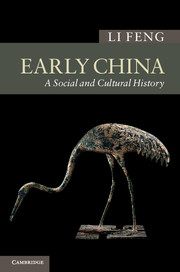Book contents
- Frontmatter
- Contents
- List of Figures
- List of Maps
- Preface
- Chronology of Early China
- Map
- 1 Introduction: Early China and its natural and cultural demarcations
- 2 The development of complex society in China
- 3 Erlitou and Erligang: early state expansion
- 4 Anyang and beyond: Shang and contemporary Bronze Age cultures
- 5 Cracking the secret bones: literacy and society in late Shang
- 6 The inscribed history: the Western Zhou state and its bronze vessels
- 7 The creation of paradigm: Zhou bureaucracy and social institutions
- 8 Hegemons and warriors: social transformation of the Spring and Autumn period (770–481 BC)
- 9 The age of territorial states: Warring States politics and institutions (480–221 BC)
- 10 Philosophers as statesmen: in the light of recently discovered texts
- 11 The Qin unification and Qin Empire: who were the terracotta warriors?
- 12 Expansion and political transition of the Han Empire
- 13 State and society: bureaucracy and social orders under the Han Empire
- 14 Ideological changes and their reflections in Han culture and Han art
- Index
- References
3 - Erlitou and Erligang: early state expansion
Published online by Cambridge University Press: 05 June 2014
- Frontmatter
- Contents
- List of Figures
- List of Maps
- Preface
- Chronology of Early China
- Map
- 1 Introduction: Early China and its natural and cultural demarcations
- 2 The development of complex society in China
- 3 Erlitou and Erligang: early state expansion
- 4 Anyang and beyond: Shang and contemporary Bronze Age cultures
- 5 Cracking the secret bones: literacy and society in late Shang
- 6 The inscribed history: the Western Zhou state and its bronze vessels
- 7 The creation of paradigm: Zhou bureaucracy and social institutions
- 8 Hegemons and warriors: social transformation of the Spring and Autumn period (770–481 BC)
- 9 The age of territorial states: Warring States politics and institutions (480–221 BC)
- 10 Philosophers as statesmen: in the light of recently discovered texts
- 11 The Qin unification and Qin Empire: who were the terracotta warriors?
- 12 Expansion and political transition of the Han Empire
- 13 State and society: bureaucracy and social orders under the Han Empire
- 14 Ideological changes and their reflections in Han culture and Han art
- Index
- References
Summary
What the “multi-region” model of Neolithic cultural development cannot explain is how state-level society arose first not from other regional traditions but from the heartland of the Yangshao culture and its successors the Longshan cultures in Henan and Shanxi. However, the line of development in this large region leading to the rise of state was by no means very straight. The power of the Taosi “chiefdom” waned after a few hundred years of prominence and whoever remained to live in the Taosi community seem to have come under domination by another nearby political center. Archaeologists have much to do to understand this process of competition among the pre-state polities and the resultant regional integration in the middle reaches of the Yellow River and other regions in the contemporary time-frame. However, at the beginning of the second millennium BC, one society had risen to a level of power that was far above the limit of other “chiefdom”-level societies in western Henan and southern Shanxi. The Erlitou state or culture occupied a critical position in the formation of state and civilization in North China. It opened a new era that was marked by royal authority, urban civilization, larger political organization, and a strong coercive military presence.
The “State” and “State Formation”
Unlike the term “chiefdom” which is essentially an anthropological construct, the term “state” has a long history in the Western intellectual tradition, and is the one modern term to which different disciplines attach different meanings. In political science which conceives the meaning of “state” in legal–political terms, the “state” is defined as the embodiment of “sovereignty,” hence there is the notion of the modern “Nation State” which identifies the present unit of the “nation” as the bearer of such sovereignty. For political economists, the “state” is an institution equipped with coercive powers, standing in opposition to the individual citizens, and is supposedly the representation of public and collective interest versus individual or private interest. But in a sociological view, which is also the view of most social historians, the “state” is a human organization with multiple qualifications including territory, unified political order, law and coercive power to enforce it, and sovereignty. Finally, in an anthropological sense, the “state” is a type of society or a “stage” in social development, being different from and more massive and complex than the “chiefdom” society, therefore, validating the concept of “state-level society.”
- Type
- Chapter
- Information
- Early ChinaA Social and Cultural History, pp. 41 - 65Publisher: Cambridge University PressPrint publication year: 2013
References
- 1
- Cited by

